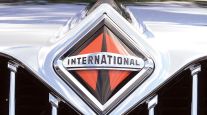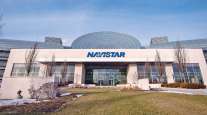Navistar’s Clarke Reports Progress in Overcoming Past Engine Woes

This story appears in the Sept. 12 print edition of Transport Topics.
LISLE, Illinois — Last week’s Volkswagen-Navistar deal was announced just before the maker of International Trucks reported quarterly earnings showing there is progress, albeit rocky, in recovering from what one of its executives called, “the sins of the past” — the 2010-2012 miscalculation on engine technology.
The original equipment manufacturer could not duplicate its fiscal second-quarter profit, which broke a streak of 14 quarterly losses — 3½ years worth. Navistar International Corp. lost $34 million, or 42 cents per share, for the three months ended July 31, as sales declined by 17.8% to $2.09 billion from the prior third fiscal quarter.
“At the end of 2012, we said we needed to fix this business from the ground up,” Navistar CEO Troy Clarke told Transport Topics during an August interview here at the company’s headquarters.
“We’re not about motor homes [a former division since sold off]. We’re a truck company, and we need to be a great truck company,” Clarke said in recounting his efforts, first as chief operating officer then, since April 2013, as CEO.
During the company’s Sept. 8 earnings call, management said poor heavy-duty truck sales — a North American phenomenon, not something unique to Navistar — kept the OEM from turning a profit.
Navistar’s Parts, Global Operations and Financial Services divisions, when combined, produced operating profits of $173 million for the quarter, up from $151 million in the year-ago quarter. The overall quarterly loss comes from the truck division’s operating loss widening to $54 million from $36 million in the year-ago period.
The company measures chargeouts of vehicles, meaning a bill for the truck or bus was sent out. Total chargeouts for the quarter declined 20%, year-over-year, to 16,100 vehicles. The segment that took the worst battering was Class 8 trucks, in which chargeouts tumbled 42% to just 5,700 units from 9,800 in last year’s comparable quarter.
“We’re really close” to turning a profit at the truck division, Clarke said. “It all depends on volume.”
Chief Financial Officer Walter Borst said during the earnings call that the company continues to purge costs so that it can make money even during lean times.
The most recent quarterly results for Navistar compare with a loss of $30 million, or 34 cents, on sales of $2.54 billion in the same time last year.
The work of reconnecting with customers has been painstaking and unglamorous. Jeff Sass, senior vice president of sales and marketing, described the process:
“One at a time, we’re going to carriers like J.B. Hunt, Prime Inc., Swift Transportation and Melton Truck Lines and putting in demo trucks to earn trust. We’ve had very good results,” he said.
“Talking with them again is a slow process for sins of the past to be overcome,” Sass added.
Clarke, 61, said he travels one week per month to visit dealers and customers within a given region.
While recovering from the past is important, Clarke said the company has to do more than just that to prosper.
“We can’t just invest to meet regulatory compliance. We need new products,” he said, adding that he wants to refresh all product lines over the next 18 months.
On Feb. 1, the company launched a new severe-service group of trucks called the HX series. A year ago, the company announced plans for joint production of Classes 4 and 5 medium-duty trucks with General Motors, where Clarke worked from 1973 to 2010.
At the end of September, the company will roll out a truck from its Project Horizon development plan, which addresses highway tractors.
The company also is pursuing benefits from connected vehicles.
Quality had to improve so reserves for warranty work could decline.
Chief Information Officer Terry Kline said that beyond telematics, the core of Navistar’s OnCommand Connect service, the company is looking at vehicle-to- vehicle and vehicle-to-infrastructure connectivity.
“We need to get safer vehicles, and we will,” Kline said. Vehicles “talking” to one another via dedicated short-range communications is the keystone of platooning, which Kline predicts will be in use before large-scale autonomous trucks.
While the North American market is most important for the company, especially Class 8, Clarke said he also would like to see Brazil turn around. The home of the recent Olympics has had profound problems, economic and political, and it is the home of most of Navistar’s overseas operations — including the manufacture of engines for Volkswagen.
Clarke said if his board of directors approves, he wants to stay, as there still is much to do.
“We’ve made 10 years’ worth of progress in three years’ worth of time,” he said, adding he wants to gain market share, but that will take time:
“This is just the first inning. I want to assure people we have a plan for the second, third and fourth innings.”




